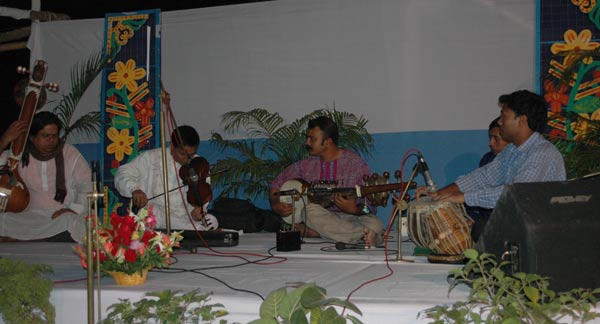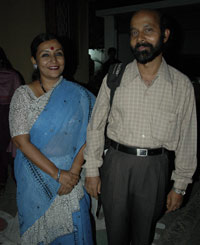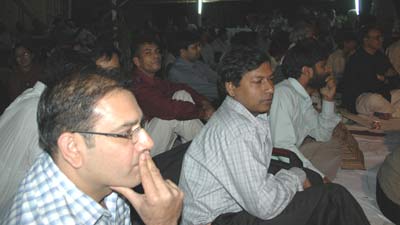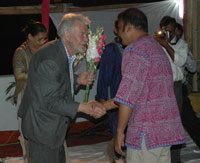SWEDISH SOUTH ASIAN STUDIES NETWORK
Cultural evening at Shangskriti Bikash Kendra (Centre for Cultural Development), Dhaka, Monday 5 December 2005
 Dr.
Liaquat Ali is a creative person.
Besides his scientific work at BIRDEM (see
our report from BIRDEM) he is also initiator and chairman of a cultural
organisation that started in 1991 in the form of ambitious study circles
on philosophy (again an idea borrowed from the Swedish society that he
was part of during the late 1980s).
Dr.
Liaquat Ali is a creative person.
Besides his scientific work at BIRDEM (see
our report from BIRDEM) he is also initiator and chairman of a cultural
organisation that started in 1991 in the form of ambitious study circles
on philosophy (again an idea borrowed from the Swedish society that he
was part of during the late 1980s).
Before we left Sweden Dr. Malin Åkerblom at ISPIC in Uppsala had enthusiastically told us about Dr. Liaquat Ali’s cultural centre, and she has been one of its well-wishers since the start, donating for example complete volumes of the Science magazine to its library.
 |
| Dr Liaguat Ali and his wife welcome guests to the Centre for Cultural Development in Dhaka. |
The philosophical study circles are still running, each one with weekly meetings for a period of two years in order to accommodate studies of the entire World philosophical traditions from Plato and Aristotle, the Vedas and the Upanishads, Ibn Sena and Imam Gajjali, Karl Marx all the way up to 20th Century philosophers such as Bertrand Russell. Since then other study circles have been introduced, on literature, music and development economics.
After Staffan had joined us at BIRDEM, we walked over to Shangskriti Bikash Kendra, located at 1/E/1 Paribagh in central Dhaka. In honour of our visit, Liaquat Ali had organised a get-together program for members of the various study circles and associates of the centre (including many of his colleagues at BIRDEM). A program including a buffet dinner, served from the centre’s popular cafeteria Shushwado, and a classical musical evening show with renowned artists: Mustafa Faruque Wahid on violin, Kamal Zahir Shamim on sharad, Prosanta Kumar Das on tabla, Rashedul Gani Rintu on esraj, Mahamudul Hassan on violin and Haripada Sutradhar on tabla.
It became a magic evening sitting on white sheets rolled out over the
top floor of the building, listening to wonderful North Indian classical
music, and meeting a large number of interesting people, Bangladeshi intellectuals
and researchers, the expatriate Europeans involved in the HDCP project
to build hospitals all over the country, and many others.
The Swedish connection with Bangladesh is not limited to scientific collaboration,
a large number of Bangladeshis have settled in Sweden during the past
decades, and one person came up to us and introduced himself in perfect
Swedish. He had lived 13 years in Stockholm, running a restaurant, but
had since then moved to Coventry in UK.
 We
were most surprised when it was time for the final concert piece for the
evening, and it turned out to be a Swedish folk song, again in honour
of our presence.
We
were most surprised when it was time for the final concert piece for the
evening, and it turned out to be a Swedish folk song, again in honour
of our presence.
 A folk song that the musicians modified so that it turned into a raga,
as beautiful as the other pieces they played during the evening. Staffan
was then requested to conclude the evening by holding a short speech and
presenting flower bouquets to the artists. We returned back to our Dhaka
home in Banani in a joyful mood. All thanks to Dr. Liaquat Ali and his
persistent efforts to bring together the best of East and West, in research
as well as in culture. Just like the great Rabindranath Tagore envisioned
a century ago.
A folk song that the musicians modified so that it turned into a raga,
as beautiful as the other pieces they played during the evening. Staffan
was then requested to conclude the evening by holding a short speech and
presenting flower bouquets to the artists. We returned back to our Dhaka
home in Banani in a joyful mood. All thanks to Dr. Liaquat Ali and his
persistent efforts to bring together the best of East and West, in research
as well as in culture. Just like the great Rabindranath Tagore envisioned
a century ago.
SASNET - Swedish South Asian Studies Network/Lund
University
Address: Scheelevägen 15 D, SE-223 70 Lund, Sweden
Phone: +46 46 222 73 40
Webmaster: Lars Eklund
Last updated
2006-02-13
